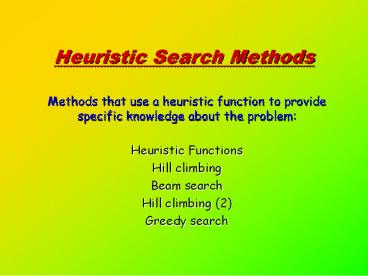Heuristic Search Methods - PowerPoint PPT Presentation
Title:
Heuristic Search Methods
Description:
How to do this in such a way that the algorithms remain generally applicable ? ... plateaus require random jumps to be combined with the hill climbing algorithm. ... – PowerPoint PPT presentation
Number of Views:107
Avg rating:3.0/5.0
Title: Heuristic Search Methods
1
Heuristic Search Methods
- Methods that use a heuristic function to provide
specific knowledge about the problem
Heuristic Functions Hill climbing Beam
search Hill climbing (2) Greedy search
2
Heuristic Functions
- To further improve the quality of the previous
methods, we need to include problem-specific
knowledge on the problem. - How to do this in such a way that the algorithms
remain generally applicable ???
3
Examples (1)
- Imagine the problem of finding a route on a road
map and that the NET below is the road map
4
Examples (2) 8-puzzle
- f1(T) the number correctly placed tiles on the
board
Most often, distance to goal heuristics are
more useful !
5
Examples (3)Manhattan distance
- f3(T) the sum of ( the horizontal vertical
distance that each tile is away from its final
destination) - gives a better estimate of distance from the goal
node
1 4 2 3 10
6
Examples (4)Chess
- F(T) (Value count of black pieces) - (Value
count of white pieces)
f
7
Hill climbing
- A basic heuristic search method
- depth-first heuristic
8
Hill climbing_1
- Example using the straight-line distance
- Perform depth-first, BUT
- instead of left-to-right selection,
- FIRST select the child with the best heuristic
value
8.9
10.4
6.9
10.4
6.7
3.0
9
Hill climbing_1 algorithm
1. QUEUE lt-- path only containing the root 2.
WHILE QUEUE is not empty
AND goal is not reached DO
remove the first path from the QUEUE
create new paths (to all children)
reject the new paths with loops
sort new paths (HEURISTIC) add
the new paths to front of QUEUE 3. IF goal
reached THEN success
ELSE failure
10
Beam search
- Narrowing the width of the breadth-first search
11
Beam search (1)
- Assume a pre-fixed WIDTH (example 2 )
- Perform breadth-first, BUT
- Only keep the WIDTH best new nodes
- depending on heuristic
- at each new level.
12
Beam search (2)
- Optimi-zation ignore leafs that are not goal
nodes (see C)
13
Beam search algorithm
- See exercises!
Properties
- Completeness
- Hill climbing YES (backtracking), Beam search
NO
- Speed/Memory
- Hill climbing
- same as Depth-first (in worst case)
- Beam search
- QUEUE always has length WIDTH, so memory usage
is constant WIDTH, time is of the order of
WIDTHmb or WIDTHdb if no solution is found
14
Hill climbing_2
- Beam search with a width of 1.
- Inspiring Example climbing a hill in the fog.
- Heuristic function check the change in altitude
in 4 directions the strongest increase is the
direction in which to move next. - Is identical to Hill climbing_1, except for
dropping the backtracking. - Produces a number of classical problems
15
Problems with Hill climbing_2
16
Comments
- Foothills are local minima hill climbing_2 cant
detect the difference. - Plateaus dont allow you to progress in any
direction. - Foothills and plateaus require random jumps to be
combined with the hill climbing algorithm. - Ridges neither the directions you have fixed in
advance all move downwards for this surface. - Ridges require new rules, more directly targeted
to the goal, to be introduced (new directions to
move) .
17
Local search
- Hill climbing_2 is an example of local search.
- In local search, we only keep track of 1 path and
use it to compute a new path in the next step. - QUEUE is always of the form
- ( p)
- Another example
- MINIMAL COST search
- If p is the current path
- the next path extends p by adding the node with
the smallest cost from the endpoint of p
18
Greedy search
- Always expand the heuristically best nodes
first.
19
Greedy search, orHeuristic best-first search
- At each step, select the node with the best (in
this case lowest) heuristic value.
20
Greedy search algorithm
1. QUEUE lt-- path only containing the root 2.
WHILE QUEUE is not empty
AND goal is not reached DO
remove the first path from the QUEUE
create new paths (to all children)
reject the new paths with loops
add the new paths and sort the entire QUEUE 3.
IF goal reached THEN success
ELSE failure































